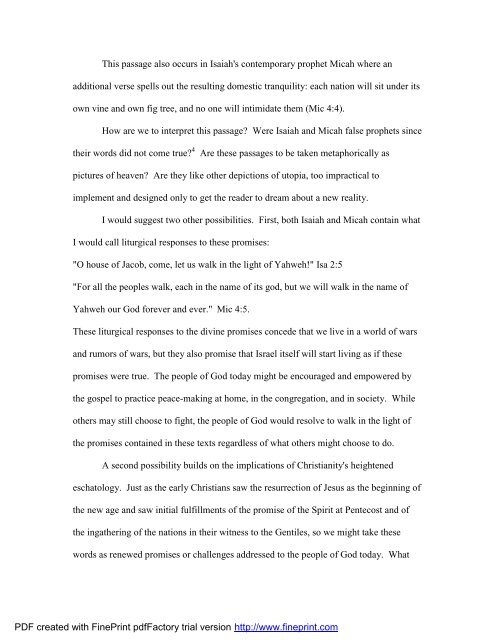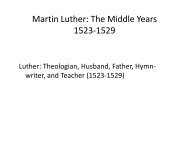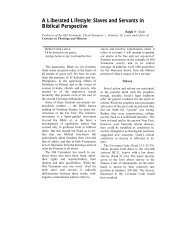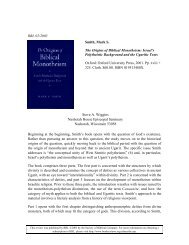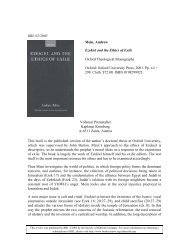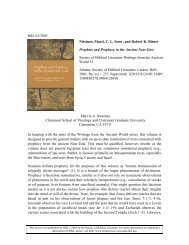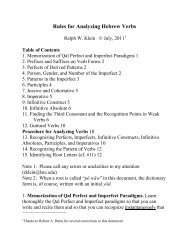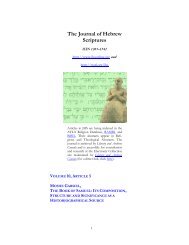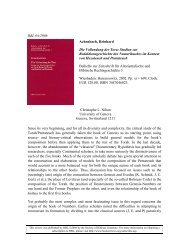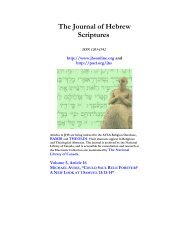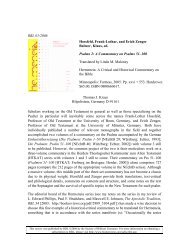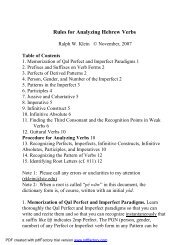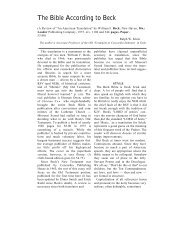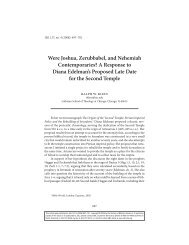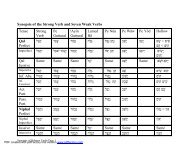Isaiah for Advent - Lutheran School of Theology at Chicago
Isaiah for Advent - Lutheran School of Theology at Chicago
Isaiah for Advent - Lutheran School of Theology at Chicago
You also want an ePaper? Increase the reach of your titles
YUMPU automatically turns print PDFs into web optimized ePapers that Google loves.
This passage also occurs in <strong>Isaiah</strong>'s contemporary prophet Micah where an<br />
additional verse spells out the resulting domestic tranquility: each n<strong>at</strong>ion will sit under its<br />
own vine and own fig tree, and no one will intimid<strong>at</strong>e them (Mic 4:4).<br />
How are we to interpret this passage? Were <strong>Isaiah</strong> and Micah false prophets since<br />
their words did not come true? 4 Are these passages to be taken metaphorically as<br />
pictures <strong>of</strong> heaven? Are they like other depictions <strong>of</strong> utopia, too impractical to<br />
implement and designed only to get the reader to dream about a new reality.<br />
I would suggest two other possibilities. First, both <strong>Isaiah</strong> and Micah contain wh<strong>at</strong><br />
I would call liturgical responses to these promises:<br />
"O house <strong>of</strong> Jacob, come, let us walk in the light <strong>of</strong> Yahweh!" Isa 2:5<br />
"For all the peoples walk, each in the name <strong>of</strong> its god, but we will walk in the name <strong>of</strong><br />
Yahweh our God <strong>for</strong>ever and ever." Mic 4:5.<br />
These liturgical responses to the divine promises concede th<strong>at</strong> we live in a world <strong>of</strong> wars<br />
and rumors <strong>of</strong> wars, but they also promise th<strong>at</strong> Israel itself will start living as if these<br />
promises were true. The people <strong>of</strong> God today might be encouraged and empowered by<br />
the gospel to practice peace-making <strong>at</strong> home, in the congreg<strong>at</strong>ion, and in society. While<br />
others may still choose to fight, the people <strong>of</strong> God would resolve to walk in the light <strong>of</strong><br />
the promises contained in these texts regardless <strong>of</strong> wh<strong>at</strong> others might choose to do.<br />
A second possibility builds on the implic<strong>at</strong>ions <strong>of</strong> Christianity's heightened<br />
esch<strong>at</strong>ology. Just as the early Christians saw the resurrection <strong>of</strong> Jesus as the beginning <strong>of</strong><br />
the new age and saw initial fulfillments <strong>of</strong> the promise <strong>of</strong> the Spirit <strong>at</strong> Pentecost and <strong>of</strong><br />
the ing<strong>at</strong>hering <strong>of</strong> the n<strong>at</strong>ions in their witness to the Gentiles, so we might take these<br />
words as renewed promises or challenges addressed to the people <strong>of</strong> God today. Wh<strong>at</strong><br />
PDF cre<strong>at</strong>ed with FinePrint pdfFactory trial version http://www.fineprint.com


